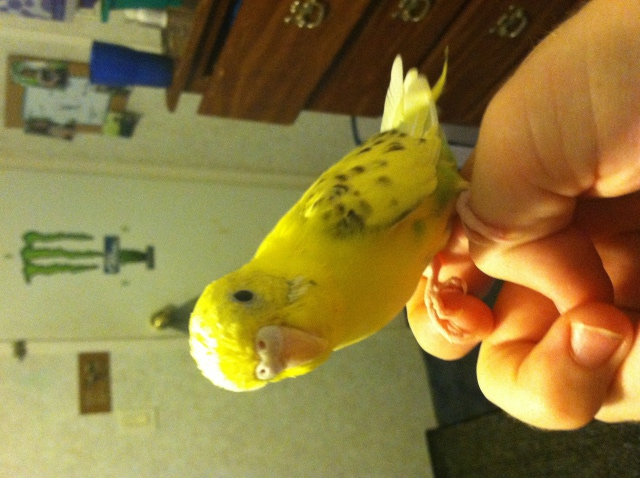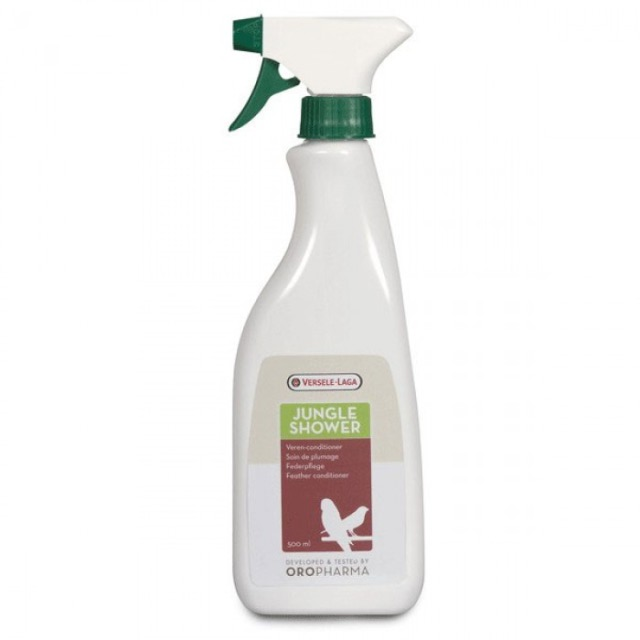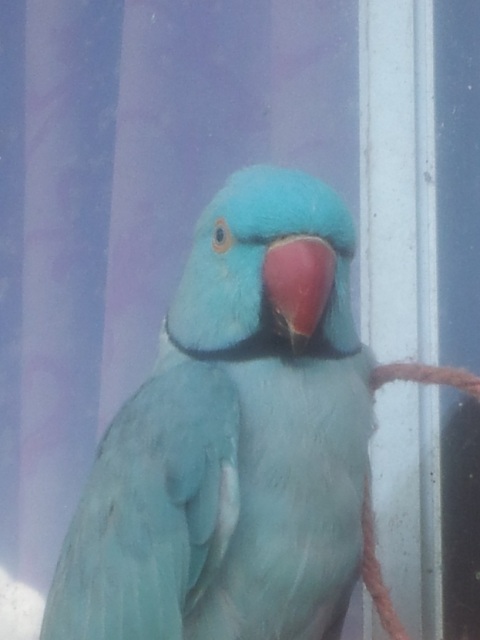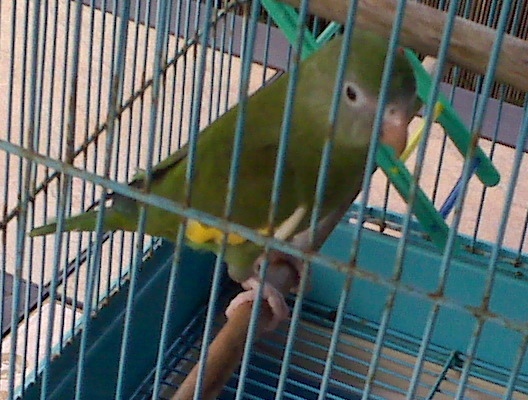QuestionQUESTION: I was given a 5 year old female blue front amazon. She was not handled byher previous owners.
we have had her for 2 weeks. I try talking softly to her when she starts her screaming but that does not stop her.
She lunges at me when I tryt o change her food and water every morning.I cover her at night and she gets 12 hours of rest time at night. Any sugestions?I say hello to her every time I come into the room and She has started to say
hello back to me then she starts to scream.
ANSWER: hi. thanks for your question. congratulations on your new parrot! sounds like you are right in your assumption that your parrots aggression toward you is due to her lack of handling. sounds like your parrot has spent the first five years of her life, her formative years, without human handling. although it is going to take alot of time and patience, she is not a lost cause! just understand that for five years, she has been able to keep people away from her by doing the very behavior you are describing at it "worked" so to speak. it is important to let her know that she is safe and cared for with you but that you are the "boss" and you are not intimidated by her threats (although it can be difficult with that sharp beak!) sounds like you are doing everything right as far as feeding and sleeping schedules. two weeks is not that long for her to feel comfortable with her new surroundings but i suspect her lack of handling is leading to these behaviors. sounds like she may be coming around though by responding to your voice!
as far as the screaming goes, i usually refer to a wonderful website (www.takoda-aviary.com) that has a terrific article on parrot screaming and curbing that screaming. it pretty much says it all. here is an excerpt (from www.takoda-aviary.com, to give credit where credit is due!):
Why does your parrot scream?
*She isn't handled enough. A bird that is used to being handled, and then suddenly has a dropoff in daily play time will become quite upset. This usually happens when someone first gets a bird. They want to play with it all the time, but after a few weeks, the novelty has worn off, and the bird gets to spend a lot more time in the cage. Parrots don't like that. They need the same amount of time outside their cage daily. (sounds like what may have happened with her and her old owners?)
*The bird is bored. Yes, parrots can get bored. Sometimes they will voice their boredom.
*Something is wrong. This is usually a different sounding scream, when the bird gets caught on something or has otherwise injured itself. They will also be very vocal if their food bowl is empty. Sometimes they will "call" to their owner, just to see where they are.
*How to combat screaming.
It is much, much easier to prevent it in the first place. Reteaching your bird that screaming is unacceptable will take a lot of time, patience, and earplugs on your part, as well as anybody that lives with you or next to you.
First, you must ignore the bird whenever it screams. Don't react in any way (unless it is a panicked, something is wrong scream). This means don't look at the bird, don't leave the room, don't do anything that suggests you even are aware there is a bird in the room. Any type of reaction from you is a reward for the bird.
Limit your playtime. If the bird is used to being out constantly, then only play with it for 30-60 minutes a day, 15-30 minutes each time. If your bird doesn't usually get much attention, then you need to play with it for an hour a day, 30 minutes each time. You should always spend time everyday with your bird, that is what keeps them tame (please see the article on biting for more info). Do not pick up the bird if it is screaming. Again, that is considered a reward. Instead, wait for the bird to become quiet, then you may interact with it. Tell it how good and pretty it is when it is quiet. Give it a few treats.
Make the cage as inviting as possible. This means more toys. You should always have more toys than the cage can hold; you should rotate toys every few weeks. You don't have to remove *all* the toys, all at once. It's usually better if you don't, in case they have a favorite. But continually rotating them in and out will help keep your bird entertained. Some of the best toys are ones they can destroy (leather, wood), cotton toys (rope perches, bird pacifiers), and bird puzzles. The bird puzzles are usually more expensive, but require the bird to use a thought process to figure out how to get the treat from the toy, and thus well worth it. An occupied bird is a happy bird!
What NOT to do!
Cover the cage. This isn't a punishment the bird will understand. Again, they aren't like cats and dogs. They learn best from positive reinforcement.
Put the bird back when it's bad. By the time you've gotten to the cage, the bird's forgotten what it did. So putting it back serves no purpose.
Throw things at the bird/cage. Do I really need to explain this one? If you want a bird that will never trust you again, this is one sure way to it.
Yell at the bird. Oh, what a fun game! If I scream really loud, mommy and daddy will scream right back! What a terrific racket we can make! I like noise.
Give the bird a treat. That does seem to make them quiet, since they've got to eat the food. But you've just rewarded it for being bad. Don't think the bird realizes that? Think again.
In Conclusion
Parrots are noisy. They like to make noise. Sometimes, they will exercise their vocals to their fullest extent just to exude the joy of being alive. This is different from constant, behavioral screaming, but sometimes new owners are unable to tell the difference. And usually, that's the part that the breeder or pet store "neglected" to mention.
It may take weeks to several months to rid yourself of the habit of shrieking, but the end results are much worth it!
I really hope this helps and i urge you to be patient and work with her. you are doing a wonderful thing by taking in a "second hand" bird and unfortunately, you are seeing the reason that so many rescued birds are returned over and over again! good luck and let me know how it works. alicia
---------- FOLLOW-UP ----------
QUESTION: Good Morning, I think I sent my next question to the wrong box so I will try again.
Libby is doing really well, I am trying to ingore the screaming int he mornings and it seems to be working, I don't look at her or talk to her when she starts in. She stops and I will talk softly to her. Thank you for the tips. I will keep at it.
My next question is that her last owners sprayed her with a mist bottle when she started screaming. I know that misting or letting them bathe is reallyy important for her feathers but how do I do this if she thinks she has done something wrong?
She is starting to sit on her perch eye level with me and watches me while I read or am watching tv. I really think
she will be a great companion once we can get thru her past.
I have a quaker parrot that talks and she will turn her head as if really listening to Max. Maybe she will pick ups ome of his words too
Answercongratulations. i am glad that some of the tips i gave you are working. keep hanging in there and doing what your doing! it works if you stick with it.
as far as spraying her with water when she started screaming, i suggest strongly against this. first of all, it doesn't work! as you can tell, she is still screaming! second, i think it is cruel and frightening for a bird. while i know some people do this to dogs, it can be scary for a bird and they may end up associating water with bad behavior. with smaller birds, it is fine to just leave a bowl of clean water in the cage and change it daily to allow the bird to bathe in it. however, i understand that it is difficult to find a bowl suitable for a macaw to bathe in as they run rather large. with this in mind, some people place their birds in the sink or shower with the water on low. this should be appraoched carefully so as not to scare the bird. also, some people place their parrot outside and sprinkle him/her with the hose (depending on the weather). the following link: http://www.netpets.com/birds/healthspa/bathing2.html
has some pretty good tips on bathing larger parrots such as macaws and cockatoos. you can use a mister however i agree with you when you say that you are concerned about her thinking she is being punished as that is what her previous owners did to her when she screamed.
thank you for the update and good luck with your little girl. i am glad to hear that you are sticking with it and it sounds like shes coming along! alicia

 Parakeet gender
Question
Parakeet
Hi, I looked for an expert und
Parakeet gender
Question
Parakeet
Hi, I looked for an expert und
 Indian Ringneck Health Issue
QuestionI have an Indian Ringneck who had been neglecte
Indian Ringneck Health Issue
QuestionI have an Indian Ringneck who had been neglecte
 RE: Indian Ringneck probems
Question
Indy our Ringneck
Thank you for your he
RE: Indian Ringneck probems
Question
Indy our Ringneck
Thank you for your he
 What type of parrot is this?
Question
Friendly bird
A week ago ths small parrot flew
What type of parrot is this?
Question
Friendly bird
A week ago ths small parrot flew
 ID Birds
Question
Panama Birds
My uncle served in Panama in 1941
ID Birds
Question
Panama Birds
My uncle served in Panama in 1941